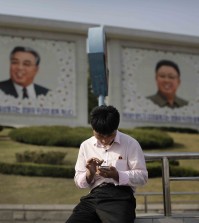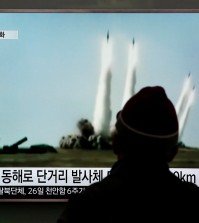- California Assembly OKs highest minimum wage in nation
- S. Korea unveils first graphic cigarette warnings
- US joins with South Korea, Japan in bid to deter North Korea
- LPGA golfer Chun In-gee finally back in action
- S. Korea won’t be top seed in final World Cup qualification round
- US men’s soccer misses 2nd straight Olympics
- US back on track in qualifying with 4-0 win over Guatemala
- High-intensity workout injuries spawn cottage industry
- CDC expands range of Zika mosquitoes into parts of Northeast
- Who knew? ‘The Walking Dead’ is helping families connect
FBI blames North Korea for Sony hack
WASHINGTON (AP) — The Obama administration on Friday formally accused the North Korean government of being responsible for the devastating hacking attack against Sony Pictures Entertainment, providing the most detailed accounting to date of a hugely expensive break-in that could lead to a U.S. response.
The FBI said in a statement it has enough evidence to conclude that North Korea was behind the punishing breach, which resulted in the disclosure of tens of thousands of leaked emails and other materials.
“North Korea’s actions were intended to inflict significant harm on a U.S. business and suppress the right of American citizens to express themselves. Such acts of intimidation fall outside the bounds of acceptable state behavior,” the statement said.
The FBI’s statement cited, among other factors, technical similarities between the Sony break-in and past “malicious cyber activity” linked directly to North Korea, including a prior cyberattack against South Korean banks and media. The Sony breach, reported late November, involved the use of destructive malware that caused the studio to take its entire computer network offline and left thousands of computers inoperable.
President Barack Obama is expected to face questions about the Sony hack at a year-end news conference with reporters later Friday.
The break-in has had wide-ranging ramifications for the studio, spilling into public view candid and confidential discussions among executives and leading to lawsuits from those who say their personal and financial data was exposed online. This week, the attack escalated with terrorist threats against moviegoers that promoted Sony this week to cancel the Christmas release of the movie “The Interview,” which for months had been harshly condemned by the North Korean government.
Sony now says it has no plans to release the film, a comedy about a plot to assassinate North Korea’s leader, Kim Jong Un.
After Sony canceled the film’s release, hackers sent a new email praising the studio’s decision as “very wise” and saying its data would be safe “as long as you make no more trouble.” The message warned the studio to “never” release the film “in any form,” including on DVD. The email was confirmed Friday by a person close to the studio who wasn’t authorized to speak publicly about the matter and requested anonymity. An FBI spokesman said authorities are aware of the email and are investigating.
North Korea has denied being responsible but earlier this month referred to the cyberattack as a “righteous deed.” A North Korean diplomat to the United Nations, Kim Un Chol, declined to comment Friday about the FBI’s accusations.
Obama administration officials had until Friday declined to openly blame North Korea but had said they were weighing various options for a response. The statement Friday did not reveal what options were being considered but did say the government would look to “impose costs and consequences.”
At first glance, the options for a U.S. response seem limited. Bringing the shadowy hackers to justice appears a distant prospect. A U.S. cyberretaliation against North Korea would risk a dangerous escalation. And North Korea is already targeted by a raft of sanctions over its nuclear weapons program.
The FBI did not indicate whether it has identified any individual hackers who might be culpable. In May, the Justice Department indicted five Chinese military officers accused of vast cyberespionage against American corporate interests, but none of those defendants has yet to set foot in an American courtroom.















